The CHS is pleased to announce the 2018-19 Fellows in Hellenic Studies. The fellowship program encourages research of the highest quality on topics related to ancient Greece. The program offers residential and non-residential options, and seeks to support collaborative and coordinating projects.
 Davide Amendola completed his PhD in Classics and Ancient History at the Scuola Normale Superiore of Pisa (2017), where he also received his BA (2010) and MA (2012). At the SNS, he has subsequently served as a postdoctoral research assistant for the project Greek Envoys and Diplomacy in the Hellenistic and Roman World (GED). He has also held visiting fellowships at Princeton University (Department of Classics) and at the École Normale Supérieure of Lyon. His research focuses on Greek political, institutional, social and cultural history, chiefly in the late Classical and Hellenistic ages. He is especially interested in ancient historical writing and antiquarianism, Greek inscriptions and epigraphic habit, papyrology, Attic oratory and Athenian political discourse. He also works on the reception of ancient historiography in Renaissance Italy and, more generally, on the history of Classical scholarship. Currently, he is revising his doctoral dissertation on the so-called Demades papyrus (P.Berol. inv. 13045) for publication in the international series Sozomena: Studies in the Recovery of Ancient Texts (De Gruyter). The purpose of his research at the CHS is to complete a new book-length project on the impact of the Athenian model in the period following Alexander’s death. In particular, it aims to understand how the first Ptolemies engaged with Classical Athens’ political history, institutions and ideals by attempting to determine in which strands and through which media they responded to the legacy of Athenian democracy.
Davide Amendola completed his PhD in Classics and Ancient History at the Scuola Normale Superiore of Pisa (2017), where he also received his BA (2010) and MA (2012). At the SNS, he has subsequently served as a postdoctoral research assistant for the project Greek Envoys and Diplomacy in the Hellenistic and Roman World (GED). He has also held visiting fellowships at Princeton University (Department of Classics) and at the École Normale Supérieure of Lyon. His research focuses on Greek political, institutional, social and cultural history, chiefly in the late Classical and Hellenistic ages. He is especially interested in ancient historical writing and antiquarianism, Greek inscriptions and epigraphic habit, papyrology, Attic oratory and Athenian political discourse. He also works on the reception of ancient historiography in Renaissance Italy and, more generally, on the history of Classical scholarship. Currently, he is revising his doctoral dissertation on the so-called Demades papyrus (P.Berol. inv. 13045) for publication in the international series Sozomena: Studies in the Recovery of Ancient Texts (De Gruyter). The purpose of his research at the CHS is to complete a new book-length project on the impact of the Athenian model in the period following Alexander’s death. In particular, it aims to understand how the first Ptolemies engaged with Classical Athens’ political history, institutions and ideals by attempting to determine in which strands and through which media they responded to the legacy of Athenian democracy.
 Lucia Athanassaki is Professor of Classical Philology at the University of Crete. She holds a BA from the University of Athens and a PhD from Brown University. She has published extensively on melic poetry, its artistic context and its ideological and political agenda. The focus of her research in recent years is on attitudes to art, lifestyle and leadership in the late 5th century as reflected in Attica drama and prose (list of publications at https://www.philology.uoc.gr/staff/athanassaki). At the CHS she will explore Euripides’ dialogue with civic iconography and its political significance.
Lucia Athanassaki is Professor of Classical Philology at the University of Crete. She holds a BA from the University of Athens and a PhD from Brown University. She has published extensively on melic poetry, its artistic context and its ideological and political agenda. The focus of her research in recent years is on attitudes to art, lifestyle and leadership in the late 5th century as reflected in Attica drama and prose (list of publications at https://www.philology.uoc.gr/staff/athanassaki). At the CHS she will explore Euripides’ dialogue with civic iconography and its political significance.
 Nicolas Bertrand studied classics in Strasbourg and in Paris, at the Sorbonne University and the École Normale Supérieure (2001–2005). He specializes in the analysis of Homeric texts, with a special interest in the workings of Homeric traditional poetics. As linguistics became more and more crucial in his research, he wrote his PhD dissertation on word order in the Homeric poems (2005–2010). While pursuing his inquiries on Homeric poetics and, more widely, Ancient Greek syntax and pragmatics, he is currently Assistant Professor (Maître de Conférences) at the University of Nice Sophia Antipolis (Nice Côte d’Azur). During his stay at the CHS, he will be writing a Handbook of Ancient Greek Word Order to present the results of his research in a useful and reader-friendly fashion.
Nicolas Bertrand studied classics in Strasbourg and in Paris, at the Sorbonne University and the École Normale Supérieure (2001–2005). He specializes in the analysis of Homeric texts, with a special interest in the workings of Homeric traditional poetics. As linguistics became more and more crucial in his research, he wrote his PhD dissertation on word order in the Homeric poems (2005–2010). While pursuing his inquiries on Homeric poetics and, more widely, Ancient Greek syntax and pragmatics, he is currently Assistant Professor (Maître de Conférences) at the University of Nice Sophia Antipolis (Nice Côte d’Azur). During his stay at the CHS, he will be writing a Handbook of Ancient Greek Word Order to present the results of his research in a useful and reader-friendly fashion.
 Manon Brouillet studied classics in Paris, at the École Normale Supérieure (2007-2012). In 2016, she received her PhD from the École des Hautes Études en Sciences sociales (EHESS). She wrote a dissertation entitled Des chants en partage. L’épopée homérique comme expérience religieuse. Her research on the Homeric epics combines historical and philological reading with anthropological questioning. Ethnological fieldwork in Burkina Faso with traditional singers led her to propose a new insight on the relationship between singer, audience, and the gods. She takes the Iliad and the Odyssey as crucial events in the ongoing experiment of Greek polytheism. Her research project during her stay at the CHS will focus on the conditions of the performance of the Homeric epics in Archaic and Classical periods, especially during panhellenic festivals.
Manon Brouillet studied classics in Paris, at the École Normale Supérieure (2007-2012). In 2016, she received her PhD from the École des Hautes Études en Sciences sociales (EHESS). She wrote a dissertation entitled Des chants en partage. L’épopée homérique comme expérience religieuse. Her research on the Homeric epics combines historical and philological reading with anthropological questioning. Ethnological fieldwork in Burkina Faso with traditional singers led her to propose a new insight on the relationship between singer, audience, and the gods. She takes the Iliad and the Odyssey as crucial events in the ongoing experiment of Greek polytheism. Her research project during her stay at the CHS will focus on the conditions of the performance of the Homeric epics in Archaic and Classical periods, especially during panhellenic festivals.
 Diane Harris Cline is an associate professor of history at George Washington University, where she teaches courses on ancient Greek history, archaeology, mythology, literature, and culture. In 2016 she won GW’s Columbian Prize for teaching and mentoring advanced undergraduates. Trained in classics at Stanford and classical archaeology at Princeton, she is the author of The Treasures of the Parthenon and Erechtheion (Oxford) and The Greeks: An Illustrated History (National Geographic). In her cross-disciplinary research, she is a pioneer in the digital humanities, applying formal social network analysis to study the social ties in ancient Greece. In partnership with Eleni Hasaki, during her fellowship Dr. Cline will be working on the connected world of potters in Ancient Athens.
Diane Harris Cline is an associate professor of history at George Washington University, where she teaches courses on ancient Greek history, archaeology, mythology, literature, and culture. In 2016 she won GW’s Columbian Prize for teaching and mentoring advanced undergraduates. Trained in classics at Stanford and classical archaeology at Princeton, she is the author of The Treasures of the Parthenon and Erechtheion (Oxford) and The Greeks: An Illustrated History (National Geographic). In her cross-disciplinary research, she is a pioneer in the digital humanities, applying formal social network analysis to study the social ties in ancient Greece. In partnership with Eleni Hasaki, during her fellowship Dr. Cline will be working on the connected world of potters in Ancient Athens.
 Alain Duplouy is Reader in Greek archaeology at the Université Paris 1 Panthéon-Sorbonne. He received his PhD from Brussels and Paris universities in 2003, and his Habilitation from Paris 1 in 2017. He has been a British Academy visiting scholar in Leeds (2009) and Fulbright scholar at UCLA (2011). He has directed archaeological fieldwork programs in both Greece and Italy, and has published extensively on elites and citizenship in archaic Greece. He is the author of Le Prestige des élites (Les Belles Lettres, 2006) and has edited with Roger Brock the collective volume Defining citizenship in archaic Greece (Oxford University Press, 2018). His next book (Construire la cité) will be published in 2019 by Les Belles Lettres. During his fellowship at the CHS, he will explore the tales related to the Cretan seer Epimenides against the history and archaeology of archaic and classical Athens.
Alain Duplouy is Reader in Greek archaeology at the Université Paris 1 Panthéon-Sorbonne. He received his PhD from Brussels and Paris universities in 2003, and his Habilitation from Paris 1 in 2017. He has been a British Academy visiting scholar in Leeds (2009) and Fulbright scholar at UCLA (2011). He has directed archaeological fieldwork programs in both Greece and Italy, and has published extensively on elites and citizenship in archaic Greece. He is the author of Le Prestige des élites (Les Belles Lettres, 2006) and has edited with Roger Brock the collective volume Defining citizenship in archaic Greece (Oxford University Press, 2018). His next book (Construire la cité) will be published in 2019 by Les Belles Lettres. During his fellowship at the CHS, he will explore the tales related to the Cretan seer Epimenides against the history and archaeology of archaic and classical Athens.
 Ben Earley is currently a researcher at the FU Berlin working with Professor Christian Wendt on the project: “Thucydides and Political Order Reconsidered: Towards a 21st Century Reading of the History of the Peloponnesian War.” His research focuses on political readings of Thucydides from the late nineteenth century to the Second World War. He is particularly interested in when Thucydides came to be seen as a relevant thinker in debates over interstate relations, the type of lessons and insights that commentators drew from the text, and the assumptions that underpinned these readings.
Ben Earley is currently a researcher at the FU Berlin working with Professor Christian Wendt on the project: “Thucydides and Political Order Reconsidered: Towards a 21st Century Reading of the History of the Peloponnesian War.” His research focuses on political readings of Thucydides from the late nineteenth century to the Second World War. He is particularly interested in when Thucydides came to be seen as a relevant thinker in debates over interstate relations, the type of lessons and insights that commentators drew from the text, and the assumptions that underpinned these readings.
He recently finished his doctorate on the “Reception of Thucydides in Eighteenth-Century British Thought” at the University of Bristol as part of Professor Neville Morley’s AHRC Reception of Thucydides project. He completed his undergraduate and taught postgraduate degrees at the University of Durham.
 Eleni Hasaki is an Associate Professor at the School of Anthropology and Department of Religious Studies and Classics at the University of Arizona and the Director of the Laboratory for Traditional Technology. Her scholarship focuses on the craft technologies in Classical antiquity, the spatial organization of workshops, and craft apprenticeship, and experimental projects on ancient Greek ceramics. She has recently launched a Web Atlas of Ceramic Kilns in Ancient Greece, a searchable database for ceramic production sites in ancient Greece covering five millennia. During the CHS collaborative fellowship, Eleni Hasaki will work with Diane Cline to employ Social Network Analysis to better understand the connected world of potters and painters in Archaic and Classical Athens (6th-5th centuries B.C.). Hasaki’s research has been funded by major institutions, including the Archaeological Institute of America, the American School of Classical Studies at Athens, the Samuel H. Kress Foundation, and the Center for Advanced Study in the Visual Arts (CASVA), National Gallery of Art.
Eleni Hasaki is an Associate Professor at the School of Anthropology and Department of Religious Studies and Classics at the University of Arizona and the Director of the Laboratory for Traditional Technology. Her scholarship focuses on the craft technologies in Classical antiquity, the spatial organization of workshops, and craft apprenticeship, and experimental projects on ancient Greek ceramics. She has recently launched a Web Atlas of Ceramic Kilns in Ancient Greece, a searchable database for ceramic production sites in ancient Greece covering five millennia. During the CHS collaborative fellowship, Eleni Hasaki will work with Diane Cline to employ Social Network Analysis to better understand the connected world of potters and painters in Archaic and Classical Athens (6th-5th centuries B.C.). Hasaki’s research has been funded by major institutions, including the Archaeological Institute of America, the American School of Classical Studies at Athens, the Samuel H. Kress Foundation, and the Center for Advanced Study in the Visual Arts (CASVA), National Gallery of Art.
 Marina Kotzamani is an Associate Professor in the Theater Department of the University of the Peloponnese. She has a doctorate in Theater from the Graduate Center of CUNY and has also studied Linguistics and Philosophy (M.Sc. MIT, B.A. UCL, London). Her work focuses on the production and reception of classical Greek drama, as well as on the contemporary theater and she has published articles in internationally acclaimed journals including PAJ, Theater and Theatre Journal. She is currently working on a book on the production history of Aristophanes’ Lysistrata from the French revolution to today. Recent work includes two articles on Iannis Xenakis: “Under the starry night: Darkness, Community and Theatricality in Iannis Xenakis’s Mycenae Polytopon” in Theatre in the Dark: Shadow, Gloom and Blackout in Contemporary Theatre, Bloomsbury, (2017) and “Greek History as Environmental Performance: Iannis Xenakis’s Mycenae Polytopon and Beyond” Gramma, (2016). She has also been working as a dramaturg and has collaborated with off and off-off Broadway theater companies in NY, including CSC and LaMama. Moreover, she has been curating exhibitions of contemporary art, including a highly successful exhibition on Bost, at the Benaki Museum in Athens (2013), which will be re-opening this year.
Marina Kotzamani is an Associate Professor in the Theater Department of the University of the Peloponnese. She has a doctorate in Theater from the Graduate Center of CUNY and has also studied Linguistics and Philosophy (M.Sc. MIT, B.A. UCL, London). Her work focuses on the production and reception of classical Greek drama, as well as on the contemporary theater and she has published articles in internationally acclaimed journals including PAJ, Theater and Theatre Journal. She is currently working on a book on the production history of Aristophanes’ Lysistrata from the French revolution to today. Recent work includes two articles on Iannis Xenakis: “Under the starry night: Darkness, Community and Theatricality in Iannis Xenakis’s Mycenae Polytopon” in Theatre in the Dark: Shadow, Gloom and Blackout in Contemporary Theatre, Bloomsbury, (2017) and “Greek History as Environmental Performance: Iannis Xenakis’s Mycenae Polytopon and Beyond” Gramma, (2016). She has also been working as a dramaturg and has collaborated with off and off-off Broadway theater companies in NY, including CSC and LaMama. Moreover, she has been curating exhibitions of contemporary art, including a highly successful exhibition on Bost, at the Benaki Museum in Athens (2013), which will be re-opening this year.
 Katerina Ladianou studied Greek Philology at the University of Crete (BA and MA) and received her Doctorate Degree at the Ohio State University. Her PhD thesis discussed the feminine voice in Archaic Greek Poetry. She has taught both Greek and Latin at the Ohio State University, University of Patras, University of Crete, and University of Athens. Her scholarly interests include Archaic Greek Poetry (both Epic and Lyric), Roman Love Elegy, performance and gender. She is the author of “The poetics of choreia. Imitation and Dance in the Anacreontea,” QUCC 80: 47-58, 2005 and “Female Choruses and Gardens of Nymphs: Visualizing Chorality in Sappho” in V. Cassato- A. Lardinois (ed.) The Look of Lyric: Greek Song and the Visual, 2016.
Katerina Ladianou studied Greek Philology at the University of Crete (BA and MA) and received her Doctorate Degree at the Ohio State University. Her PhD thesis discussed the feminine voice in Archaic Greek Poetry. She has taught both Greek and Latin at the Ohio State University, University of Patras, University of Crete, and University of Athens. Her scholarly interests include Archaic Greek Poetry (both Epic and Lyric), Roman Love Elegy, performance and gender. She is the author of “The poetics of choreia. Imitation and Dance in the Anacreontea,” QUCC 80: 47-58, 2005 and “Female Choruses and Gardens of Nymphs: Visualizing Chorality in Sappho” in V. Cassato- A. Lardinois (ed.) The Look of Lyric: Greek Song and the Visual, 2016.
During her fellowship at the CHS, she will be studying representations of cult in collaboration with Lucia Athanassaki. More specifically, her plan is to work on a monograph regarding the significance of Euripidean representations of cultic activities, cultic etiquette, and attitudes to cult for the characterization of the dramatic characters.
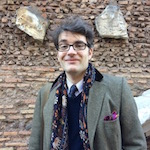 Christoph Lundgreen is Assistant Professor at the Institute of History, Technische Universität Dresden (TUD), Germany. He holds an M.A. from Humboldt Universität zu Berlin, a PhD from TUD, and a Diplôme national de docteur from ÉPHÉ-Sorbonne, Paris. In addition to the CHS Fellowship, he has been awarded numerous grants and fellowships, including the Heinz Maier-Leibnitz-Prize, the highest accolade for early career researchers in Germany. In 2015, he was a Visiting Scholar at Stanford; recently he has spent 18 wonderful months in Rome thanks to a Feodor Lynen Research Fellowship of the Alexander von Humboldt Foundation. He has served on the board of both the Mommsen-Gesellschaft and the British Epigraphy Society. In 2016, he was elected to the Junge Akademie at the Berlin-Brandenburg Academy of Sciences and Humanities and the German National Academy of Sciences Leopoldina. Before focusing on Ancient Greece, he has widely published on the Roman Republic, with an emphasis on Political and Cultural History, especially on the History of Norms, Laws and Legal systems. At the CHS, he will be working on a monograph on Dimensions of Staatlichkeit in the Early Greek World, applying modern governance theory to the world of Homer, Gortyn and Antigone.
Christoph Lundgreen is Assistant Professor at the Institute of History, Technische Universität Dresden (TUD), Germany. He holds an M.A. from Humboldt Universität zu Berlin, a PhD from TUD, and a Diplôme national de docteur from ÉPHÉ-Sorbonne, Paris. In addition to the CHS Fellowship, he has been awarded numerous grants and fellowships, including the Heinz Maier-Leibnitz-Prize, the highest accolade for early career researchers in Germany. In 2015, he was a Visiting Scholar at Stanford; recently he has spent 18 wonderful months in Rome thanks to a Feodor Lynen Research Fellowship of the Alexander von Humboldt Foundation. He has served on the board of both the Mommsen-Gesellschaft and the British Epigraphy Society. In 2016, he was elected to the Junge Akademie at the Berlin-Brandenburg Academy of Sciences and Humanities and the German National Academy of Sciences Leopoldina. Before focusing on Ancient Greece, he has widely published on the Roman Republic, with an emphasis on Political and Cultural History, especially on the History of Norms, Laws and Legal systems. At the CHS, he will be working on a monograph on Dimensions of Staatlichkeit in the Early Greek World, applying modern governance theory to the world of Homer, Gortyn and Antigone.

Timothy J. Moore is John and Penelope Biggs Distinguished Professor of Classics at Washington University in St. Louis. He received his B.A. from Millersville University and his Ph.D. from the University of North Carolina, and he has taught at Harvard, Texas A&M University, the University of Texas at Austin, the University of Colorado, and the Ruhr Universität in Bochum, Germany. His publications include Artistry and Ideology: Livy’s Vocabulary of Virtue, The Theater of Plautus, Music in Roman Comedy, Roman Theatre, two edited volumes on Greek and Roman comedy, an online database of the meters of Roman Comedy, and articles on Greek and Roman music, theater, and literature, the teaching of Greek and Latin, American Musical Theater, and Japanese comedy. Current projects include a long-range project on musical theater in ancient Greece and Rome. He has received fellowships and grants from the American Academy in Rome, the National Endowment for the Humanities, the Alexander von Humboldt Foundation, the Mellon Foundation, the Loeb Classical Library Foundation, and the Center for the Humanities at Washington University in St. Louis.
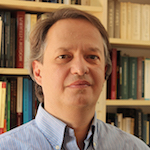 Attila Németh (PhD in Classics, Royal Holloway, University of London) is a research fellow at the Department of Philosophy, Eötvös Loránd University, Budapest. He specializes in ancient philosophy, with a focus on the Hellenistic period. He has recently published a monograph, Epicurus on the Self (Routledge: London/New York, 2017), which received an award of excellence in the same year, granted by the Hungarian Association for Philosophy. His new research focuses on the literary self in Roman philosophy in the context of the development of Roman selfhood. He is investigating how the need to think philosophically in Latin changed the language of philosophy and expanded the concept and representation of selfhood through the literary genres in which philosophical ideas were expressed, by studying how the notions of the ‘self’ and ‘selfhood’ were created and revised in literary and philosophical discourse, through speech and language, and through the interaction of literary form and philosophical ideas.
Attila Németh (PhD in Classics, Royal Holloway, University of London) is a research fellow at the Department of Philosophy, Eötvös Loránd University, Budapest. He specializes in ancient philosophy, with a focus on the Hellenistic period. He has recently published a monograph, Epicurus on the Self (Routledge: London/New York, 2017), which received an award of excellence in the same year, granted by the Hungarian Association for Philosophy. His new research focuses on the literary self in Roman philosophy in the context of the development of Roman selfhood. He is investigating how the need to think philosophically in Latin changed the language of philosophy and expanded the concept and representation of selfhood through the literary genres in which philosophical ideas were expressed, by studying how the notions of the ‘self’ and ‘selfhood’ were created and revised in literary and philosophical discourse, through speech and language, and through the interaction of literary form and philosophical ideas.
 Jessica Paga (PhD Princeton 2012) is an archaeologist and architectural historian who specializes in Greek architecture of the Archaic and Classical periods. She is currently an Assistant Professor in the Department of Classical Studies at William & Mary, prior to which she held an Andrew W. Mellon Post-Doctoral Fellowship in Modeling Interdisciplinary Inquiry at Washington University in St. Louis. Jess is a senior archaeologist with the American Excavations in the Sanctuary of the Great Gods on Samothrace, Greece, as well as field director for the Contrada Mango Project in Segesta, Sicily. While at the CHS, Jess will work on completing her book on monumental architecture in Athens and Attika during the early democratic period, and begin researching her next project on the relationship between architecture and politics in the pre-modern Mediterranean.
Jessica Paga (PhD Princeton 2012) is an archaeologist and architectural historian who specializes in Greek architecture of the Archaic and Classical periods. She is currently an Assistant Professor in the Department of Classical Studies at William & Mary, prior to which she held an Andrew W. Mellon Post-Doctoral Fellowship in Modeling Interdisciplinary Inquiry at Washington University in St. Louis. Jess is a senior archaeologist with the American Excavations in the Sanctuary of the Great Gods on Samothrace, Greece, as well as field director for the Contrada Mango Project in Segesta, Sicily. While at the CHS, Jess will work on completing her book on monumental architecture in Athens and Attika during the early democratic period, and begin researching her next project on the relationship between architecture and politics in the pre-modern Mediterranean.
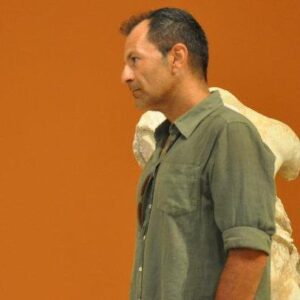 Kostas Paschalidis holds a doctorate in Prehistoric Archaeology (University of Ioannina) and specializes in the archaeology of the Mycenaean period. Since 2002 he has worked as an Antiquities Curator at the Prehistoric Collection of the National Archaeological Museum at Athens, after having collaborated for ten years in excavations at various sites of Greece and Jordan. Since 2012 he has been employed as a Secretary at the Central Archaeological Council. He is also a member of the scientific team in the systematic excavation program of the Mycenaean settlement at Mygdalia near Patras. He has lectured and published studies on subjects related to Aegean burial customs, architecture and pottery, as well as on archival matters, i.e. the history of the Archaeological Service and of the National Archaeological Museum.
Kostas Paschalidis holds a doctorate in Prehistoric Archaeology (University of Ioannina) and specializes in the archaeology of the Mycenaean period. Since 2002 he has worked as an Antiquities Curator at the Prehistoric Collection of the National Archaeological Museum at Athens, after having collaborated for ten years in excavations at various sites of Greece and Jordan. Since 2012 he has been employed as a Secretary at the Central Archaeological Council. He is also a member of the scientific team in the systematic excavation program of the Mycenaean settlement at Mygdalia near Patras. He has lectured and published studies on subjects related to Aegean burial customs, architecture and pottery, as well as on archival matters, i.e. the history of the Archaeological Service and of the National Archaeological Museum.
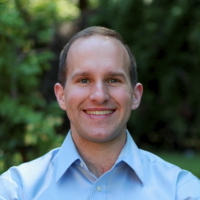 Bryan Reece works in Ancient Greek Philosophy. His research primarily concerns Aristotle’s ethics, metaphysics, and philosophy of action. He obtained a PhD in Philosophy from the University of Toronto in 2016, with certification from the Collaborative Program in Ancient and Medieval Philosophy. While at the CHS he is writing a monograph that discusses the role that Aristotle assigns to theoretical and practical wisdom in the happy life. His ‘Are There Really Two Kinds of Happiness in Aristotle’s Nicomachean Ethics?’ is forthcoming in Classical Philology, and ‘Out of Thin Air? Diogenes of Apollonia on Causal Explanation’ is forthcoming in an edited volume with Cambridge University Press entitled Heat, Pneuma, and Soul in Ancient Philosophy and Science: From the Presocratics to Aristotle.
Bryan Reece works in Ancient Greek Philosophy. His research primarily concerns Aristotle’s ethics, metaphysics, and philosophy of action. He obtained a PhD in Philosophy from the University of Toronto in 2016, with certification from the Collaborative Program in Ancient and Medieval Philosophy. While at the CHS he is writing a monograph that discusses the role that Aristotle assigns to theoretical and practical wisdom in the happy life. His ‘Are There Really Two Kinds of Happiness in Aristotle’s Nicomachean Ethics?’ is forthcoming in Classical Philology, and ‘Out of Thin Air? Diogenes of Apollonia on Causal Explanation’ is forthcoming in an edited volume with Cambridge University Press entitled Heat, Pneuma, and Soul in Ancient Philosophy and Science: From the Presocratics to Aristotle.
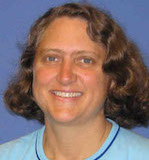 Heather L. Reid is Professor of Philosophy at Morningside College in Sioux City, Iowa, 2015 Fellow of the American Academy in Rome, director of Morningside’s Semester in Italy program, and founder of the Fonte Aretusa organization. She has published numerous books and articles in ancient philosophy, philosophy of sport, and Olympic Studies. She has also been invited to lecture on these topics in Beijing, London, Rome, Seoul, and at the International Olympic Academy in Olympia, Greece. She is past president (2005-2007) and recipient of the distinguished service (2009) and distinguished scholar (2015) awards of the International Association for the Philosophy of Sport. She serves on the boards of the Journal of the Philosophy of Sport, The International Journal of Applied Philosophy, Physical Culture and Sport Studies and Research, and Sport, Ethics and Philosophy. Her monographs include Introduction to the Philosophy of Sport (2012) Athletics and Philosophy in the Ancient World: Contests of Virtue (2011), and The Philosophical Athlete (2002). She is also co-author of The Olympics and Philosophy (2012), Aretism: An Ancient Sports Philosophy for the Modern Sports World (2011), and Filosofia dello Sport (2011). Her current research explores the relationship between ethics and athletics in ancient Greece and Rome.
Heather L. Reid is Professor of Philosophy at Morningside College in Sioux City, Iowa, 2015 Fellow of the American Academy in Rome, director of Morningside’s Semester in Italy program, and founder of the Fonte Aretusa organization. She has published numerous books and articles in ancient philosophy, philosophy of sport, and Olympic Studies. She has also been invited to lecture on these topics in Beijing, London, Rome, Seoul, and at the International Olympic Academy in Olympia, Greece. She is past president (2005-2007) and recipient of the distinguished service (2009) and distinguished scholar (2015) awards of the International Association for the Philosophy of Sport. She serves on the boards of the Journal of the Philosophy of Sport, The International Journal of Applied Philosophy, Physical Culture and Sport Studies and Research, and Sport, Ethics and Philosophy. Her monographs include Introduction to the Philosophy of Sport (2012) Athletics and Philosophy in the Ancient World: Contests of Virtue (2011), and The Philosophical Athlete (2002). She is also co-author of The Olympics and Philosophy (2012), Aretism: An Ancient Sports Philosophy for the Modern Sports World (2011), and Filosofia dello Sport (2011). Her current research explores the relationship between ethics and athletics in ancient Greece and Rome.
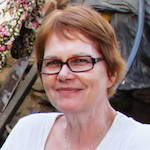 Marijana Ricl is Professor of Ancient History in the Department of History at Belgrade University, Faculty of Philosophy. She received her BA in Classical Studies and her MA and PhD in Ancient History from Belgrade University, Faculty of Philosophy. Her research focus is Ancient History and Epigraphy of the Balkans and Asia Minor. She has published extensively on the social history and religious cults of both regions. She is the editor or co-editor of two corpora of Greek and Latin inscriptions (The Inscriptions of Alexandreia Troas, Inschriften griechischer Städte aus Kleinasien, Bd. 53, Bonn 1997) and Inscriptiones Graecae Epiri, Macedoniae, Thraciae, Scythiae Consilio et Auctoritate Academiae Scientiarum Berolinensis et Brandenburgensis editae, pars II: Inscriptiones Macedoniae, fasc. II: Inscriptiones Macedoniae Septentrionalis, sectio prima: Inscriptiones Lyncestidis, Heracleae, Pelagoniae, Derriopi, Lychnidi (with F. Papazoglu, M. Milin and K. Hallof; Berlin/New York 1999). She is also the associate editor of A Lexicon of Greek Personal Names. Volume VA: Coastal Asia Minor: Pontos to Ionia (with Th. Corsten and R.W.V. Catling; Oxford 2010). Her CHS project is a book entitled A New Corpus of Greek and Latin Inscriptions from the Kaystros River Valley in Southern Lydia. In addition to the publication of 130 unpublished Greek inscriptions discovered during Ricl’s epigraphical surveys in southern Lydia, the book will contain a study on the history of the Kaystros River valley in Antiquity.
Marijana Ricl is Professor of Ancient History in the Department of History at Belgrade University, Faculty of Philosophy. She received her BA in Classical Studies and her MA and PhD in Ancient History from Belgrade University, Faculty of Philosophy. Her research focus is Ancient History and Epigraphy of the Balkans and Asia Minor. She has published extensively on the social history and religious cults of both regions. She is the editor or co-editor of two corpora of Greek and Latin inscriptions (The Inscriptions of Alexandreia Troas, Inschriften griechischer Städte aus Kleinasien, Bd. 53, Bonn 1997) and Inscriptiones Graecae Epiri, Macedoniae, Thraciae, Scythiae Consilio et Auctoritate Academiae Scientiarum Berolinensis et Brandenburgensis editae, pars II: Inscriptiones Macedoniae, fasc. II: Inscriptiones Macedoniae Septentrionalis, sectio prima: Inscriptiones Lyncestidis, Heracleae, Pelagoniae, Derriopi, Lychnidi (with F. Papazoglu, M. Milin and K. Hallof; Berlin/New York 1999). She is also the associate editor of A Lexicon of Greek Personal Names. Volume VA: Coastal Asia Minor: Pontos to Ionia (with Th. Corsten and R.W.V. Catling; Oxford 2010). Her CHS project is a book entitled A New Corpus of Greek and Latin Inscriptions from the Kaystros River Valley in Southern Lydia. In addition to the publication of 130 unpublished Greek inscriptions discovered during Ricl’s epigraphical surveys in southern Lydia, the book will contain a study on the history of the Kaystros River valley in Antiquity.
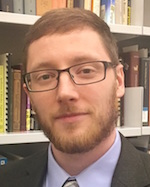 Joshua Smith is a Hellenist at Johns Hopkins University, where he has served as Assistant Professor since 2015. He received his PhD from the University of Wisconsin in 2013 and subsequently taught at Wisconsin, the University of Chicago, and Cornell College before coming to Hopkins. His primary research focus is on ancient scholarship and the history of literary criticism, with secondary interests in ancient medicine and lyric poetry. Publications include an article rhipsaspia in the work of Archilochus, Alcaeus, Anacreon, and Horace (American Journal of Philology 136.2); a textbook on Greek and Latin medical terminology (The Hippocrates Code, co-authored with J.C. McKeown, Hackett, 2016); and a forthcoming article exploring the degree to which ancient readers viewed Sophocles through a Homeric lens. His current large-scale project is a book-length study on the history of Homeric citation in the ancient commentary, a project that tackles traditional philological problems with the help of tools and perspectives from the digital humanities. He will use support from the CHS to complete a monograph based on his research in this area.
Joshua Smith is a Hellenist at Johns Hopkins University, where he has served as Assistant Professor since 2015. He received his PhD from the University of Wisconsin in 2013 and subsequently taught at Wisconsin, the University of Chicago, and Cornell College before coming to Hopkins. His primary research focus is on ancient scholarship and the history of literary criticism, with secondary interests in ancient medicine and lyric poetry. Publications include an article rhipsaspia in the work of Archilochus, Alcaeus, Anacreon, and Horace (American Journal of Philology 136.2); a textbook on Greek and Latin medical terminology (The Hippocrates Code, co-authored with J.C. McKeown, Hackett, 2016); and a forthcoming article exploring the degree to which ancient readers viewed Sophocles through a Homeric lens. His current large-scale project is a book-length study on the history of Homeric citation in the ancient commentary, a project that tackles traditional philological problems with the help of tools and perspectives from the digital humanities. He will use support from the CHS to complete a monograph based on his research in this area.
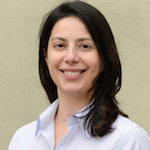 After studying Classics and Philosophy in Athens and Berlin, Georgia Tsouni received in 2010 a PhD in Classics (Ancient Philosophy) at the University of Cambridge (Newnham College), supervised by Prof. David Sedley. Her PhD formed part of the AHRC-funded project “Greco-Roman Philosophy in the First Century BCE”. She has held a fellowship at the Central European University, Institute of Philosophy (2011-2012). Since 2012, she has worked as a post-doctoral researcher and lecturer (Assistentin) to the Chair of History of Philosophy at the University of Bern in Switzerland, where she teaches courses in Ancient Philosophy, including an Introduction to Ancient Greek for Philosophy students. Her monograph Antiochus and Peripatetic Ethics is currently under publication with Cambridge Classical Studies (CUP). Most recently, she has completed a new edition and translation of (Ar.?) Didymus’ Summary of Peripatetic Ethics, which survives in the Byzantine anthology of Stobaeus (Rutgers University Studies in Classical Humanities, vol. XX). She has also published numerous volume chapters and articles on Aristotelian/Peripatetic and Stoic ethical and political philosophy. As a fellow at CHS she look forward to working on her second monograph on political habituation and political wisdom in Aristotle.
After studying Classics and Philosophy in Athens and Berlin, Georgia Tsouni received in 2010 a PhD in Classics (Ancient Philosophy) at the University of Cambridge (Newnham College), supervised by Prof. David Sedley. Her PhD formed part of the AHRC-funded project “Greco-Roman Philosophy in the First Century BCE”. She has held a fellowship at the Central European University, Institute of Philosophy (2011-2012). Since 2012, she has worked as a post-doctoral researcher and lecturer (Assistentin) to the Chair of History of Philosophy at the University of Bern in Switzerland, where she teaches courses in Ancient Philosophy, including an Introduction to Ancient Greek for Philosophy students. Her monograph Antiochus and Peripatetic Ethics is currently under publication with Cambridge Classical Studies (CUP). Most recently, she has completed a new edition and translation of (Ar.?) Didymus’ Summary of Peripatetic Ethics, which survives in the Byzantine anthology of Stobaeus (Rutgers University Studies in Classical Humanities, vol. XX). She has also published numerous volume chapters and articles on Aristotelian/Peripatetic and Stoic ethical and political philosophy. As a fellow at CHS she look forward to working on her second monograph on political habituation and political wisdom in Aristotle.
 Roger Woodard received his PhD from the University of North Carolina in Chapel Hill. He is the Andrew van Vranken Raymond Professor of the Classics at the University of Buffalo (State University of New York), where he arrived in 1999, chairing the Department of Classics from 2014 to 2017. Before being named to the Raymond Chair he was Professor of Classics and Linguistics at the University of Southern California and earlier held positions at Johns Hopkins University and Swarthmore College. He has held visiting appointments at Oxford University, Max Planck Institutes in Berlin and Leipzig, among other European institutions, and is a member of the Society of Fellows of the American Academy in Rome. He has lectured across the US and Europe, as well as in East Asia. More recent published work includes The Textualization of the Greek Alphabet (Cambridge University Press), Myth, Ritual, and the Warrior in Roman and Indo-European Antiquity (CUP), The Cambridge Companion to Greek Mythology (CUP), Indo-European Sacred Space (University of Illinois Press). Current projects include The Cambridge History of Mythology and Mythography (CUP), of which he is the editor and to which he is contributing a chapter on Georges Dumézil.
Roger Woodard received his PhD from the University of North Carolina in Chapel Hill. He is the Andrew van Vranken Raymond Professor of the Classics at the University of Buffalo (State University of New York), where he arrived in 1999, chairing the Department of Classics from 2014 to 2017. Before being named to the Raymond Chair he was Professor of Classics and Linguistics at the University of Southern California and earlier held positions at Johns Hopkins University and Swarthmore College. He has held visiting appointments at Oxford University, Max Planck Institutes in Berlin and Leipzig, among other European institutions, and is a member of the Society of Fellows of the American Academy in Rome. He has lectured across the US and Europe, as well as in East Asia. More recent published work includes The Textualization of the Greek Alphabet (Cambridge University Press), Myth, Ritual, and the Warrior in Roman and Indo-European Antiquity (CUP), The Cambridge Companion to Greek Mythology (CUP), Indo-European Sacred Space (University of Illinois Press). Current projects include The Cambridge History of Mythology and Mythography (CUP), of which he is the editor and to which he is contributing a chapter on Georges Dumézil.
 Jed Wyrick is a professor of Comparative Religion and Humanities at California State University, Chico. He has written on Greco-Judaean literature, its presentation of biblical characters, and the idea of pseudepigraphy. He has also published The Ascension of Authorship: Attribution, Textualization, and Canon Formation in Jewish, Hellenistic, and Christian Traditions (Cambridge, MA: Harvard University Press, 2004). He is currently working on two monographs exploring the surviving fragments of the Peri Ioudaiôn of Artapanus, an (early) Ptolemaic Greek text that focuses on the lives of Abraham, Joseph, and Moses in Egypt. His broader interests include Hellenistic biography and scholarship, early biblical interpretation, the reception of ideas from Plato and Aristotle in Western religions, and animals in religion and culture (goats and donkeys in particular), as well as classical music and the piano (which he plays). In 2017-2018 he has been serving as the Chair of the Academic Senate at CSU, Chico.
Jed Wyrick is a professor of Comparative Religion and Humanities at California State University, Chico. He has written on Greco-Judaean literature, its presentation of biblical characters, and the idea of pseudepigraphy. He has also published The Ascension of Authorship: Attribution, Textualization, and Canon Formation in Jewish, Hellenistic, and Christian Traditions (Cambridge, MA: Harvard University Press, 2004). He is currently working on two monographs exploring the surviving fragments of the Peri Ioudaiôn of Artapanus, an (early) Ptolemaic Greek text that focuses on the lives of Abraham, Joseph, and Moses in Egypt. His broader interests include Hellenistic biography and scholarship, early biblical interpretation, the reception of ideas from Plato and Aristotle in Western religions, and animals in religion and culture (goats and donkeys in particular), as well as classical music and the piano (which he plays). In 2017-2018 he has been serving as the Chair of the Academic Senate at CSU, Chico.
-
Fellowships
- Fellowships in Hellenic Studies
- Early Career Fellowships
- Summer Fellowships
- CHS-IHR Joint Fellowship
- Current Residential Fellows
- Previous Fellows Previous Fellows – Chronological Lists
